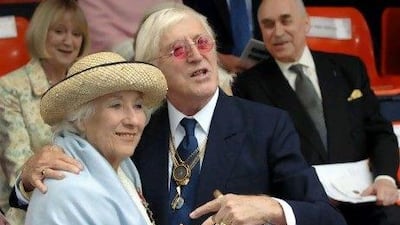LONDON // Sir Jimmy Savile, the BBC television icon who died last year at the age of 84, was never considered a normal man.
There were the oversized sunglasses, the hyper-bling gold necklaces and colourful tracksuits. The bizarre catchphrases, such as "How's about that then?" and "Now then, now then". The persistent questions about his solitary bachelor existence.
But the British public loves an eccentric and, from the 1960s until the 1990s, he was one of the biggest names at Britain's state-owned broadcaster and built a reputation as a tireless supporter of hospital and children's charities.
Last October, thousands turned out to watch as his gold-plated coffin was carried through his northern-England hometown of Leeds.
But in the past two weeks, the adulation has soured into revulsion.
A documentary shown on the Britain's commercial television station ITV1, hosted by a child protection expert, featured interviews with five women, now in their 40s and 50s, who detailed the sexual abuse they had suffered at the hands of Savile as young girls.
The documentary triggered such a torrent of similar allegations that one BBC presenter, Jeremy Vine, yesterday said Savile could become known as "one of the most serious predatory paedophiles in criminal history".
The police have now officially opened investigations into 12 cases of abuse, but have been inundated with calls since the programme aired. Scotland Yard is pursuing close to 350 lines of inquiry and estimate that, so far, there are 60 cases to examine.
Many are surprised that the stories are emerging only now. It has been revealed that Savile faced six sexual abuse investigations by police, the first dating back to 1959 when he was a nightclub owner in Leeds. All were dropped due to lack of evidence.
It appears his reputation for charity work deterred almost all victims from speaking out and blinded colleagues to his actions.
With Savile dead, much public anger has been directed at the BBC. The broadcaster has been forced to launch an investigation into why one of its flagship current affairs programmes, Newsnight, dropped a 10-minute filmed investigation of the allegations against Savile in December. Its editor, Peter Rippon, has said the report was dropped due to a lack of concrete evidence.
The BBC's director-general, George Entwistle, who was the head of commissioning and broadcasting at the time, will be questioned over his decision to go ahead with a series of programmes celebrating Savile's life at Christmas, despite being warned about the Newsnight film.
Mr Entwistle, barely two months into the top job, claims he had no knowledge of the film's content and did not ask because he did not want to be seen to interfere in the "independence of news and current affairs". The claim has been described as "barely credible" by one of the BBC's own media analysts.
In the ITV documentary, one woman described repeated sexual encounters with Savile when she was 15 years old, including intercourse in his dressing room at BBC Broadcasting House in the 1970s.
"It happened on a number of occasions," she said during the film. "He would do the sex act really quickly before anyone else came in."
So trusted was the presenter that he was given gold-plated keys to Broadmoor secure mental hospital in the late 1980s as a reward for his volunteer work and was in charge of a task force overseeing management restructuring at the hospital. There are claims he molested at least one 17-year-old patient.
His victims say their silence stemmed from fear and confusion over the huge gulf between his public and private personas.
"Being a teenager and not understanding things, you do blame yourself," said one victim on the documentary. "There was always an air of - not exactly menace - but an air that he had power and contacts and you wouldn't want to mess with him."
One woman from Duncroft Manor, a school for troubled teenagers that Savile visited frequently, said she had tried to protest after Savile molested her in his caravan, but was put in solitary confinement at the school for two to three days until she retracted the allegations.

